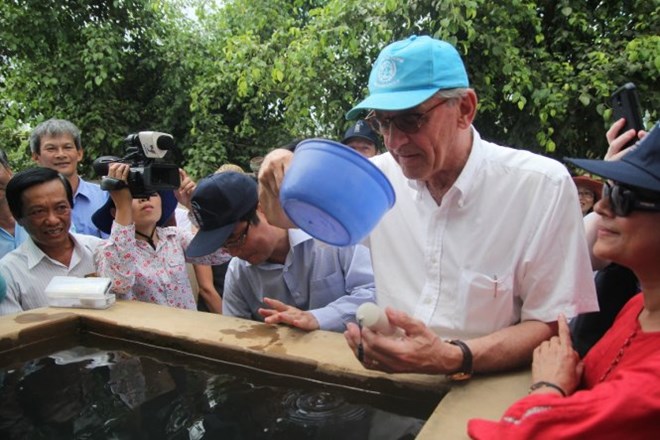United Nations (UN) Deputy Secretary General Jan Eliasson made a fact-finding trip to the southern province of Ben Tre on May 5 to find out about the impacts of ongoing drought and saline intrusion.

United Nations (UN) Deputy Secretary General Jan Eliasson inspected water in the area (Source: tuoitre.vn)
Meeting with a local household victim, Eliasson vowed to seek solutions to helping affected farmers.
He later inspected a landslide in Bao Thuan commune where tens of hectares of soil have been lost to blasting sea waves every year.
Truong Duy Hai, Deputy Chairman of the provincial People’s Committee, said over 20,000ha of winter-spring crops have been completely destroyed, leading to food shortages.
Minister of Agriculture and Rural Development Cao Duc Phat informed the UN Deputy Secretary General that not only the Mekong Delta, but the central and Central Highlands are suffering from severe drought.
The Mekong Delta loses 1 million tonnes of rice, over 9,000ha of fruit while more than 200,000 households lack enough water.
Eliasson suggested Vietnam work with countries to devise a joint action plan and solutions conducive to climate change.
He vowed to assist Vietnamese victims in drought-stricken areas and informed international organisations about Vietnam’s ongoing disasters.
The UN official said he will convey information and images of Vietnam’s climate change-induced losses to a meeting in Turkey later this month.
Ca Mau: Over 8,000 households in urgent need of fresh water
As many as 14,472 households in the southernmost province of Ca Mau are facing a shortage of clean water, more than 8,000 of which are in dire need, according to the provincial People’s Committee’s Office.
In order to deal with the situation, the provincial Department of Agriculture and Rural Development is asked to further invest in water supply facilities in disadvantaged and remote communes.
The province is currently accelerating the upgrading of the water supply system in Bien Bach commune in Thoi Binh district as well as laying 24 kilometres of water pipe in Tran Van Thoi and U Minh districts.
Ca Mau is expected to put into operation three water supply facilities in Nam Can and Tran Van Thoi districts next month.
In the short term, Ca Mau also plans to provide 1,450 tanks of water to disadvantaged and ethnic minority households.
Nearly 18 bln VND for Ca Mau’s recovery from drought, saline intrusion
Nearly 18 billion VND (800,000 USD) from the State budget has helped the southernmost province of Ca Mau with recovery from the severe drought and saline intrusion.
The provincial authorities directed localities to dredge 9 fresh water canals in districts of Tran Van Thoi, U Minh, Thoi Binh and Ca Mau city, and dig new canals in Ca Mau city.
The provincial Department of Agriculture and Rural Development is building a water pumping station worth nearly 1.2 billion VND in U Minh district, while repairing and building three irrigational sluices in the communes of Khanh Binh Tay, Khanh Hung and Khanh Binh in Tran Van Thoi district.
Additional state budget spending will be earmarked for affected areas to overcome drought and saltwater intrusion that occurred during the winter-spring crop between 2015 and 2016.
The water shortage has affected 10,000 hectares of rice and 7,000 hectares of local crops and fruit trees, of which up to 3,000 hectares of crops were completely destroyed. Around 35,000 hectares out of 45,000 hectares of cajuput forest have also dried up.
As of April 13, 2016, more than 390,000 households in the Central Highlands, Mekong Delta, and south central region faced water shortages.
Drought and saltwater intrusion damaged over 232,000 ha of rice, 61,992 ha of fruit and 4,052 ha of aquaculture. The total economic loss was estimated at over 5.1 trillion VND (229.5 million USD).
More support given to bring water to drought-hit residents
The Ministry of Natural Resources and Environment (MoNRE) will give financial aid to 13 Mekong Delta and Central Highlands provinces to provide drought-affected residents with water for daily use.
The beneficiary Mekong Delta provinces are Vinh Long, Tra Vinh, Ben Tre, Kien Giang, Long An, Tien Giang, Soc Trang and Ca Mau. In the Central Highlands, the targeted localities are Gia Lai, Kon Tum, Dak Lak, Dak Nong and Lam Dong.
They will receive 500 million VND (over 22,400 USD) apiece.
MoNRE Minister Tran Hong Ha recently conducted an inspection of the drought in the regions.
He said economies can be impacted by water scarcity, and water security is even more important to Vietnam since most of its water sources hail from other countries.
He urged relevant agencies to expeditiously form proposals, based on which the Government can negotiate with other nations to build water use mechanisms that are in line with international rules and practices and do not considerably affect other countries which share the same water sources.
The lingering drought has wreaked havoc on the Mekong Delta and Central Highlands.
In the Mekong Delta alone, about 225,800 households are facing water shortages. More than 208,000 hectares of rice, over 9,400 hectares of fruit trees and about 2,000 hectares of shrimp farming areas have been affected by the drought and saltwater intrusion, according to data released at a conference in Soc Trang on April 28.
The Ministry of Agriculture and Rural Development said since the end of 2015, saltwater has entered 50-150 km deep into the mainland in areas around the Vam Co, Tien and Hau rivers, much higher than the average figure recorded in previous years.
Vietnam has sent urgent appeals to international communities, asking for 48.5 million USD to deal with the impact of increasingly severe drought and saltwater intrusion.
VNA